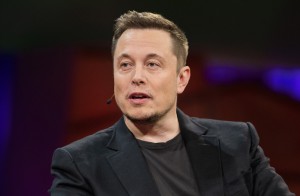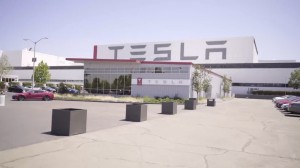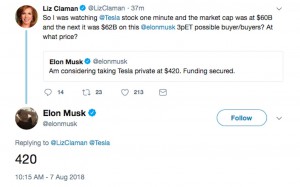
Tesla CEO Elon Musk revealed a few details about the plan to take the EV maker private he teased last week.
In a Monday morning blog post, Tesla CEO Elon Musk has offered some critical new details about the plan, first announced last week, to take the battery-carmaker private, pointing to a Saudi sovereign investment fund as the potential source of funding — though he also cautioned it would be “premature” to offer full details at this point.
Last Tuesday, the 47-year-old chief executive set off alarm bells when he posted a tweet declaring his interest in taking Tesla private at a price of $420 per share. The news sent investors scurrying to snap up Tesla stock which quickly approached an all-time high before settling back two days later.
With virtually no details offered, Musk and Tesla quickly came under scrutiny from analysts, investors and the Securities and Exchange Commission which has begun to probe his comments to see if they violate federal securities law. Tesla now faces two lawsuits, as well, alleging the Tuesday announcement was really a “nuclear attack” on short-sellers.
While Musk offered a few, scattershot details last week, the Monday morning blog post marks the first time he appears to be confirming speculation that the Saudi Public Investment Fund is the source of the comment in his original post that “funding (is) secured.” But whether it is, indeed, secure is not yet certain.
(For the full Musk Monday morning blog post, Click Here.)
The Saudis clearly are interested in Tesla, having already purchased a 5% stake worth more than $2 billion. Representatives of the sovereign fund, Musk wrote Monday, have “approached me multiple times about taking Tesla private.” And the subject apparently came up again during a meeting late last month. Musk said he “left the July 31st meeting with no question that a deal with the Saudi sovereign fund could be closed.”
Tesla went public in 2010 with its stock reaching just $19.20 during their first day of trading on the NASDAQ exchange. TSLA shares topped out at $389.61 last September, though they’ve been riding a roller-coaster ever since, dropping as low as $244.59 this past April before rebounding sharply in recent weeks, buoyed by Musk’s promise to deliver a profit and positive cashflow during the second half of this year.
At the price the stock opened at on Monday morning, Tesla has a market capitalization of more than $60 billion, about $10 billion more than General Motors. But that would jump about 20% if Musk and company followed up on the $420 target price for going private – a substantial number even for the cash-rich Saudis. Whether anybody else would need to be brought in remains unclear.
“Before anyone is asked to decide on going private, full details of the plan will be provided, including the proposed nature and source of the funding to be used. However, it would be premature to do so now,” Musk said in his Monday morning blog post.
It’s possible, however, that the Saudis alone could provide the necessary capital. Notably, Musk has indicated that he hopes to retain a roughly 20% stake in Tesla were it to go private, and he expressed his hope, in a tweet posted last week, that “all” current investors would remain with the battery-carmaker under the new ownership structure he envisioned.
That said, investors would have to accept having far less control of the company and limited opportunities to sell their shares in the future.
(Click Here for more about the rally and fall of Tesla stock.)
On the other hand, Musk and his management team would face far less public scrutiny and not have to worry about constantly baking into their business plan steps meant to appease Wall Street. In particular, Musk would be able to wave goodbye to the short-sellers betting on Tesla’s stock price to plunge, seemingly the bane of his existence. But he is clearly not through with them yet.
Tesla is now facing two lawsuits filed Friday on behalf of short-sellers who claim Musk’s tweets inflated the price all investors had to pay and, in particular, cost “shorts” hundreds of millions of dollars. Musk has repeatedly called out those betting on Tesla’s stock price to tumble and, in its lawsuit, one of the plaintiffs, Kalman Isaacs, described the CEO’s tweets as a “nuclear attack” intended to “complete decimate” short-sellers.
Those lawsuits could actually be the lesser of Musk’s worries. Tesla now also faces a probe by the Securities and Exchange Commission.
The courts have upheld the right of companies to use social media to post news, but they must still follow some basic rules. Tweets, blogs and Facebook posts, for example, can’t be used to manipulate stock prices. Companies and their executives must prove that they have both the intent and means to back up social media posts. If the SEC determines Musk had broken those guidelines, he and Tesla could face some serious problems, including hefty fines.
Even if federal regulators eventually clear Musk, the events of the last week have raised new concerns about the use of social media – especially Twitter, with its limits on the length of posts – to conduct critical business.
“Twitter is not designed to provide full and fair disclosure. That doesn’t mean that you couldn’t, but in a series of 20 to 30 characters I’m not sure you’re getting full disclosure,” Zachary Fallon, a former SEC attorney and principal at law firm Blakemore Fallon, told the Reuters news service.
Meanwhile, Musk and Tesla aren’t the only ones coming under scrutiny. The NASDAQ exchange has also taken heat for its slow response to the original Musk tweet. It went live at 12:48 EDT last Tuesday and, typically, the exchange would have been expected to halt trading in TSLA shares until key questions were answered and made public. Instead, NASDAQ waited until 2:08 to suspend trading. And it allowed trading to resume at 3:45 p.m.
Harvey Pitt, the former SEC chairman, declared the delay and subsequent restart of trading “unprecedented,” and “highly problematic.”
(Click Here for more on what the SEC is looking for.)
What happens next from Tesla’s standpoint? Musk noted a special committee of the board of directors has been set up to examine a final proposal “if and when (it) is presented.” While he hasn’t provided any details, including timing, Musk added that if the plan is approved by the full board, it would then “be presented to Tesla shareholders for a vote.”



The ultimate irony is an electric car company being provided funding from a country which made billions from selling oil.